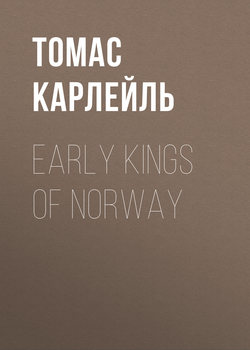Читать книгу Early Kings of Norway - Томас Карлейль - Страница 3
CHAPTER II. ERIC BLOOD-AXE AND BROTHERS
ОглавлениеIn such violent courses Haarfagr's sons, I know not how many of them, had come to an untimely end; only Eric, the accomplished sea-rover, and three others remained to him. Among these four sons, rather impatient for property and authority of their own, King Harald, in his old days, tried to part his kingdom in some eligible and equitable way, and retire from the constant press of business, now becoming burdensome to him. To each of them he gave a kind of kingdom; Eric, his eldest son, to be head king, and the others to be feudatory under him, and pay a certain yearly contribution; an arrangement which did not answer well at all. Head-King Eric insisted on his tribute; quarrels arose as to the payment, considerable fighting and disturbance, bringing fierce destruction from King Eric upon many valiant but too stubborn Norse spirits, and among the rest upon all his three brothers, which got him from the Norse populations the surname of Blod-axe, "Eric Blood-axe," his title in history. One of his brothers he had killed in battle before his old father's life ended; this brother was Bjorn, a peaceable, improving, trading economic Under-king, whom the others mockingly called "Bjorn the Chapman." The great-grandson of this Bjorn became extremely distinguished by and by as Saint Olaf. Head-King Eric seems to have had a violent wife, too. She was thought to have poisoned one of her other brothers-in-law. Eric Blood-axe had by no means a gentle life of it in this world, trained to sea-robbery on the coasts of England, Scotland, Ireland and France, since his twelfth year.
Old King Fairhair, at the age of seventy, had another son, to whom was given the name of Hakon. His mother was a slave in Fairhair's house; slave by ill-luck of war, though nobly enough born. A strange adventure connects this Hakon with England and King Athelstan, who was then entering upon his great career there. Short while after this Hakon came into the world, there entered Fairhair's palace, one evening as Fairhair sat Feasting, an English ambassador or messenger, bearing in his hand, as gift from King Athelstan, a magnificent sword, with gold hilt and other fine trimmings, to the great Harald, King of Norway. Harald took the sword, drew it, or was half drawing it, admiringly from the scabbard, when the English excellency broke into a scornful laugh, "Ha, ha; thou art now the feudatory of my English king; thou hast accepted the sword from him, and art now his man!" (acceptance of a sword in that manner being the symbol of investiture in those days.) Harald looked a trifle flurried, it is probable; but held in his wrath, and did no damage to the tricksy Englishman. He kept the matter in his mind, however, and next summer little Hakon, having got his weaning done,—one of the prettiest, healthiest little creatures,—Harald sent him off, under charge of "Hauk" (Hawk so called), one of his Principal, warriors, with order, "Take him to England," and instructions what to do with him there. And accordingly, one evening, Hauk, with thirty men escorting, strode into Athelstan's high dwelling (where situated, how built, whether with logs like Harald's, I cannot specifically say), into Athelstan's high presence, and silently set the wild little cherub upon Athelstan's knee. "What is this?" asked Athelstan, looking at the little cherub. "This is King Harald's son, whom a serving-maid bore to him, and whom he now gives thee as foster-child!" Indignant Athelstan drew his sword, as if to do the gift a mischief; but Hauk said, "Thou hast taken him on thy knee [common symbol of adoption]; thou canst kill him if thou wilt; but thou dost not thereby kill all the sons of Harald." Athelstan straightway took milder thoughts; brought up, and carefully educated Hakon; from whom, and this singular adventure, came, before very long, the first tidings of Christianity into Norway.
Harald Haarfagr, latterly withdrawn from all kinds of business, died at the age of eighty-three—about A.D. 933, as is computed; nearly contemporary in death with the first Danish King, Gorm the Old, who had done a corresponding feat in reducing Denmark under one head. Remarkable old men, these two first kings; and possessed of gifts for bringing Chaos a little nearer to the form of Cosmos; possessed, in fact, of loyalties to Cosmos, that is to say, of authentic virtues in the savage state, such as have been needed in all societies at their incipience in this world; a kind of "virtues" hugely in discredit at present, but not unlikely to be needed again, to the astonishment of careless persons, before all is done!
